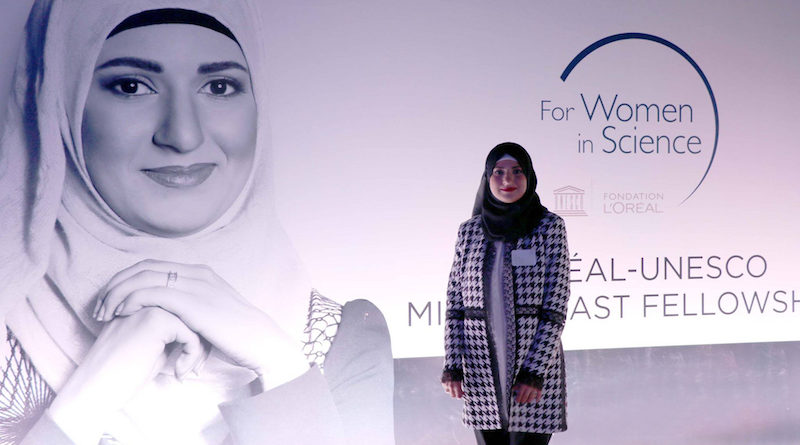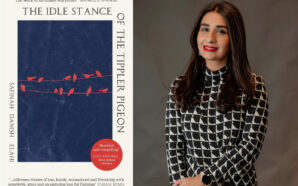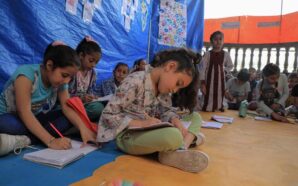Abu Dhabi (UAE) March 14th, 2017: The Masdar Institute of Science and Technology, an independent, research-driven graduate-level university focused on advanced energy and sustainable technologies, today announced that PhD student Nazek El-Atab has been selected for the 2017 L’Oréal-UNESCO For Women in Science (FWIS) Rising Talent Award for the African and Arab region.
The award will be presented to El-Atab at the International Rising Talent Gala, which will be held in Paris on 23 March 2017. The award citation states that El-Atab represents the future of science and recognizes her outstanding potential and contribution to the creation of innovative solutions in field of research. Her current research focuses on the fabrication of low-power, low-cost, high-speed nano-memory devices, which can be used in electronic equipment such as cell phones, laptops, medical devices, and military systems.
The L’Oréal-UNESCO FWIS International Rising Talents are chosen by an international selection committee formed of renowned scientists. Dedicated to both honoring distinguished women scientists as well as supporting promising young women researchers throughout their careers, the L’Oréal-UNESCO program established the International Rising Talent Grants to annually award 15 PhD students and post-doctoral fellows for their potential. Chosen from among the winners of the 250 fellowships awarded locally by L’Oréal subsidiaries and UNESCO around the world, these young researchers are considered the future of science.
Dr. Behjat Al Yousuf, Provost, Masdar Institute, said: “We congratulate Nazek for winning this recognition and bringing further pride and honor to the UAE. She is an example of the knowledge and expertise that Masdar Institute imparts to its students to explore new realms in science. We agree L’Oréal-UNESCO that Nazek represents ‘the future of science’ and we are confident she will achieve greater honors in her future endeavors.”
El-Atab’s faculty advisor Dr. Ammar Nayfeh, Associate Professor, Department of Electrical Engineering and Computer Science (EECS), Nano Electronics and Photonics (NEP) Lab, said: “I am proud of Nazek for winning the L’Oréal-UNESCO 2017 International Rising Talents award. With her hard work and dedication, she remains an emerging role model in the Arab world for women in science. She has published 11 papers in top journals and presented her work at many top international conferences and I am confident she is only beginning along list of future achievements.”
The L’Oréal-UNESCO FWIS International Rising Talents are chosen by an international selection committee formed of renowned scientists. Dedicated to both honoring distinguished women scientists as well as supporting promising young women researchers throughout their careers, the L’Oréal-UNESCO program established the International Rising Talent Grants to annually award 15 PhD students and post-doctoral fellows for their potential.
“Students like Nazek highlight the value of what Masdar Institute can provide while creating the next generation of scientists. I also thank Masdar Institute and the Government of Abu Dhabi for supporting such novel research by providing the cleanroom, testing and microscopy facilities where Nazek did her work. The shared lab system and collaborative nature at Masdar Institute allows students like Nazek to continue achieving milestones,” Dr. Nayfeh added.
El-Atab said: “I am extremely honored to be receiving the L’Oreal-UNESCO FWIS 2017 International Rising Talents award. It is truly rewarding to know that my hard work is being recognized for the second time. Being selected for this prestigious award at this age motivates me to continue striving for excellence in my academic and professional pursuits, particularly in the fields of nanotechnology and microsystems engineering. Masdar Institute’s high profile and experienced faculty, state-of-the-art laboratories and cleanroom, and the visionary management, all played a key role in my achievements. My deepest gratitude goes to my advisor Dr. Nayfeh, who was involved in every aspect of my research. His guidance and direction helped me immensely and he was an inspiration for me on many issues including how to run a research group.”
This is not the first time El Atab has won such honor. She was also one of the four recipients of the 2015 L’Oreal-UNESCO FWIS Middle East Fellowships, which included a €20,000 (AED78,500) grant towards her research. She believes that the 2015 Fellowship, plus the support of Dr. Nayfeh at Masdar Institute, helped her win the 2017 International Rising Talents award.
El-Atab explained: “I used the 2015 Middle East fellowship for a visiting researcher position at Stanford University, where I conducted high-impact research and learned from experts. At Stanford, I was able to grow Zirconia nano-islands using the atomic layer deposition system, and at Masdar Institute I fabricated memory devices with the grown Zirconia nano-islands.”
She also used part of the fellowship money to present her research at the IEEE Nanotechnology Conference in Japan in 2016.
With these achievements, El-Atab is looking forward to widening her research experience and learning more from experts in the fields of microsystems engineering and nanotechnology as a postdoctoral researcher in a top university.
The jury for the L’Oréal-UNESCO FWIS International Rising Talents included renowned experts including Prof. Aleksey Khokhlov, of Lomonosov Moscow State University, Prof. Ewa Lojkowska of Międzyuczelniany Wydział Biotechnologii Uniwersytetu Gdańskiego, Poland, Prof. Marcella Motta, of University Milan, Prof. Gloria Montenegro, of. Pontificia Universidad Católica de Chile. Prof. Yan Shen, from University of Victoria, BC, Canada, Prof. Maria D. Vargas, of Universidade Federal Fluminense, Brazil, Dr. H Krishnamurthy of the National Centre for Biological Sciences, India, Dr. Marie Abboud of Saint Joseph University, Lebanon, Prof. Abdelaziz Benjouad, of Université Internationale de Rabat, Rabat, Dr. Bruno Bernard, cell biologist, embryologist and biochemist and a Fellow at L’Oreal Recherche, Clichy, France, Prof. Nadia Ghazzali, Industrial Alliance Chair for Women in Science and Engineering in Quebec, Canada, and Ms Lucy Hoareau, UNESCO Program Specialist responsible for Life Sciences.
About Masdar Institute
The Masdar Institute of Science and Technology (Masdar Institute) was established by the government of Abu Dhabi as a not-for-profit, private graduate university to develop indigenous R&D capacity in Abu Dhabi addressing issues of importance to the region.
In collaboration with the Massachusetts Institute of Technology (MIT), Masdar Institute has developed an academic and research platform that articulates its mission and vision according to critical energy and sustainability challenges.
An important characteristic of Masdar Institute is its focus on complex real-world problems that require a multidisciplinary approach for the development of solutions from an integrated technology, systems and policy perspective. This multi-interdisciplinary and integrated approach is supported by the structure of its academic programs and by the emphasis placed on engaging external partners from industry, government, and other academic institutions in collaborative activities.
Serving as a key pillar of innovation and human capital, Masdar Institute remains fundamental to Masdar’s core objectives of developing Abu Dhabi’s knowledge economy and finding solutions to humanity’s toughest challenges such as climate change.
Masdar Institute integrates theory and practice to incubate a culture of innovation and entrepreneurship, working to develop the critical thinkers and leaders of tomorrow. With its world-class faculty and top-tier students, the Institute is committed to finding solutions to the challenges of clean energy and climate change through education and research.
Masdar Institute offers degrees in:
- MSc Engineering Systems and Management
- MSc Computing and Information Science
- MSc Materials Science and Engineering
- MSc Mechanical Engineering
- MSc Water and Environmental Engineering
- MSc Microsystems Engineering
- MSc Electrical Power Engineering
- MSc Chemical Engineering
- MSc Sustainable Critical Infrastructure
- PhD in Interdisciplinary Engineering











